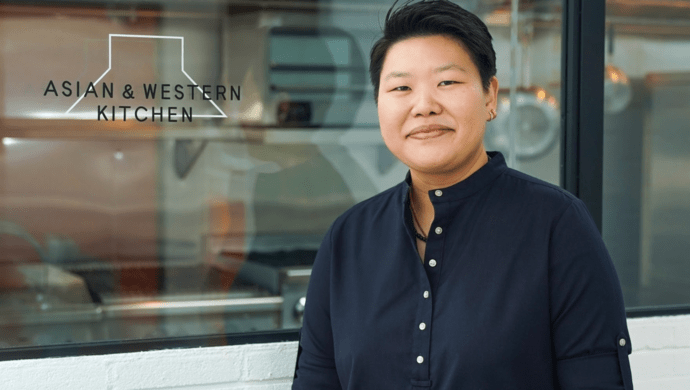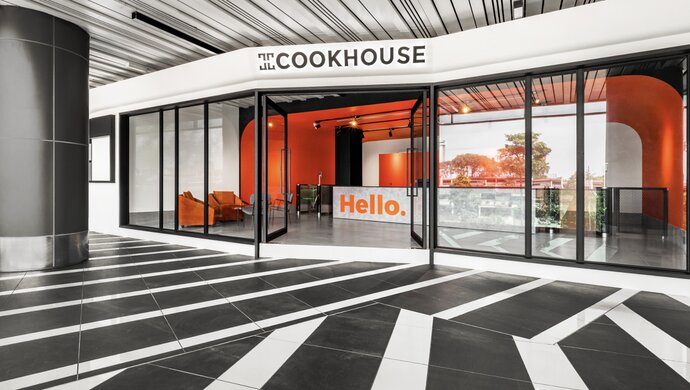
CookHouse founder and CEO Huen Su San
While holidaying in Hong Kong a few years ago, Huen Su San chanced upon a Korean food brand. A successful businesswoman, she was already running a restaurant chain back home in Malaysia that had grown to nine outlets in Klang Valley.
Su San thought this Korean brand concept would work well in Malaysia and decided to start it as a side venture.
“I could not have timed it better as the Korean food craze landed in Malaysia shortly after. I saw my first Korean dessert outlet grow to four outlets, followed by a successful introduction of three Korean BBQ brands into Malaysia,” she recounted the story to e27.
Cut to now, Su San’s Beyond Korea Dining Group operates ten restaurant outlets across the four brands and two central kitchens.
Having run a successful F&B business, Su San faced many pain points and challenges, and she was determined to resolve them.
Also Read: Everything from soup to nuts: Meet the 27 ghost kitchen startups in Southeast Asia
“I realised that F&B businesses would stand to gain immensely through a co-sharing kitchen and asset-light model,” she said. “Cloud kitchens are a more efficient way to operate and grow F&B online and delivery sales. This spurred me into action to start building Malaysia’s first shared kitchen in 2019, a few months before the COVID-19 pandemic struck.”
Thus, CookHouse took birth. A cloud kitchen enabler, CookHouse rents out fully-equipped ready-to-move-in kitchen facilities to F&B businesses for food production. Started in 2020 at the peak of the pandemic crisis, the company quickly grew to four locations, with another two in the pipeline.
As of now, over 35 different brands are operating within CookHouse’s cloud kitchen facilities.
CokHouse doesn’t own any in-house food brands at the moment.
More room to pursue cloud kitchen
Su San started her career in commercial real estate in Singapore before returning to Malaysia to join the construction industry. She learnt the ropes of the local events industry after building Glasshouse at Seputeh, an indoor garden events venue in Kuala Lumpur. Having built strong teams around these businesses, Su San had leeway to pursue the cloud kitchen concept.
“CooKhouse can be described as a combination of different concepts amalgamated through my different industry experiences,” Su San remarked.
The dark kitchen venture has plans to expand beyond Klang Valley to other states and urban cities in Malaysia. Su San also hopes to explore international markets such as Jakarta, Singapore and Bangkok in the coming years.
“The online food and food delivery market in Malaysia is still in the early stages, and there’s still plenty of room to grow,” she shared.
While the pandemic has resulted in mushrooming all sorts of cloud kitchens in Malaysia, running cloud kitchens is not easy during the ongoing crisis. “Think about the F&B operators badly hit by the pandemic. They are unlikely to start new ventures in cloud kitchens. To run cloud kitchens with several operators like ours, our team has to coordinate many different moving parts simultaneously and have to balance and address the needs of all of our tenants,” the CookHouse founder and CEO elaborated.

CookHouse’s revenue comes primarily through the rentals and the services offered. It also generates revenues from the fees from its ordering platform at its hybrid kitchens, along with dine-in services.
The ghost kitchen startup recently partnered with Maybank Islamic to assist micro-and SME food businesses to obtain halal certification. They are working together to offer CookHouse’s F&B partners financial assistance and halal certification through its facilities and cloud kitchens.
A self-funded company, CookHouse has fundraising plans. Su San hopes to find the right investment partners to continue to grow the concept across Malaysia and internationally.
Also Read: How a few up and coming virtual kitchens revitalise the pandemic-hit F&B industry in Malaysia
“We started CookHouse just a year ago but quickly grew to four locations, thanks to the pandemic and the popularity of cloud kitchens. While fundraising plans are in the pipeline, achieving profitability is our main focus,” she said.
With the sector continuously growing, cloud kitchens are here to stay in Malaysia.
“New-age tech has already started to blend into cloud kitchens and food delivery markets with the use of drones to send deliveries, robotic arms in kitchens, and of course the use of cloud computing and big data,” Su San concluded.
—
Image Credit: CookHouse
The post How CookHouse, started amidst COVID-19, managed to win 35 F&B clients in Malaysia within a year appeared first on e27.

